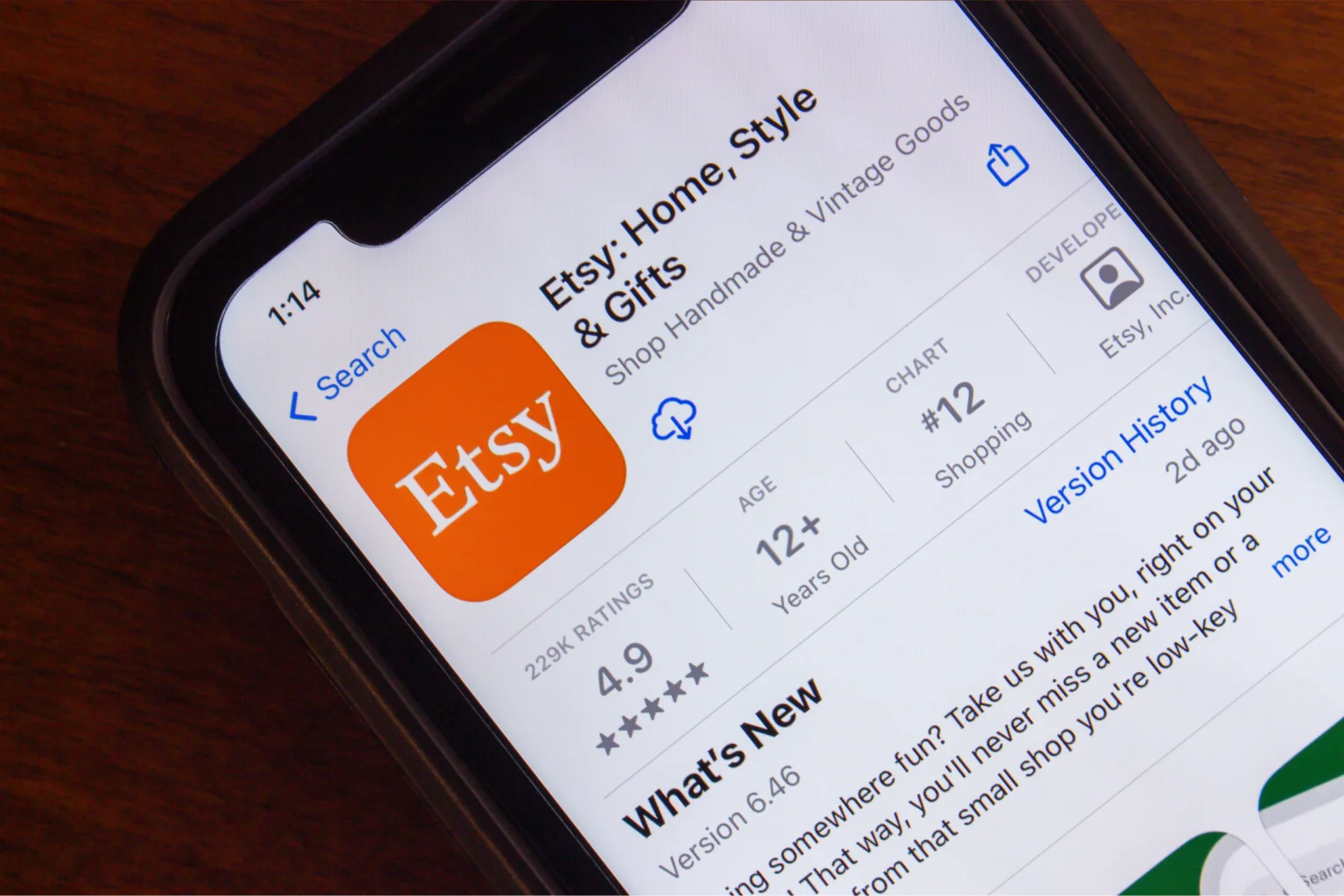Sell custom products with Printify
Many online business owners consider selling on Etsy worth it, especially if you focus on niche markets like custom, vintage, or handmade products. Its massive built-in audience makes it a global powerhouse for turning your creative hobby into passive income.
But if you want to know how to make money on Etsy long term, you’ll need to navigate rising fees, intense competition, and an evolving algorithm.
In this guide, we’ll answer the ultimate question – is selling on Etsy worth it? Explore the pros and cons to consider before you start selling.
This post may contain affiliate links, which means we may earn a commission if you make a purchase through those links. This comes at no additional cost to you.
Is it worth selling on Etsy?
With millions of shoppers and an active seller community, Etsy is an excellent marketplace to start making money online. With the right niche and consistent effort, you can turn your original designs into a profitable Etsy business.
So, is selling on Etsy worth it? Let’s find out.
Who is Etsy for?

Etsy is for anyone looking to turn their creative passion into a business.
Many Etsy sellers are artists, crafters, designers, and vintage item collectors. Compared to other online marketplaces, this platform focuses more on originality over mass production – connecting you with a global audience that values unique products.
Key Etsy market stats
- By the end of 2025, the number of active Etsy buyers reached 86.6 million.
- 5.5 million sellers are currently active within the Etsy marketplace.
- 74% of Etsy shoppers are located in the US.
- The average Etsy shopper spends $121 on the platform.
- Etsy’s revenue in late 2025 reached $2.854 billion, showing a 1.98% increase compared to the previous year.
- Sales typically peak between October and December during the holiday season.
What are the best-selling items on Etsy?
To find out the best-selling Etsy categories, we used eRank to analyze top search volumes – and here are the results:
- Jewelry– Popular items include personalized jewelry, like name necklaces and custom-engraved bracelets.
- Craft supplies and tools – Many Etsy community members thrive selling materials that help others make handmade items.
- Wedding gifts and accessories – Bestsellers include custom guestbooks, personalized bridesmaid tattoos, and unique cake toppers not available at other online retailers.
- Paper-based products– Stickers, planner inserts, and greeting cards lead this category. Many successful Etsy sellers also offer digital downloads that customers can print at home.
- Home decor items – Think hand-poured candles, personalized throw pillows, and custom wall art.
What are the pros and cons of selling on Etsy?

Pros of selling on Etsy
Why is Etsy a good place to sell? Here’s why many entrepreneurs choose to start selling custom items on Etsy.
1. Easy to use
Etsy makes it easy to sell products without having your own online store. This way, sellers can manage orders and provide excellent customer service with little technical experience.
With Etsy, you get:
- A fast Etsy store setup and guided onboarding to sell online immediately.
- Simple editor for creating your product listings.
- Easy Shop Manager for checking orders, shipping status, and inventory.
- Real-time stats to monitor your Etsy shop performance.
- Messaging tools for communicating with Etsy customers.
- Secure payment processing to keep your funds safe.
- Protection for Etsy customers and sellers.
Read our Etsy shop setup guides to learn how to open your storefront and start listing your first products.
2. Low startup costs
Starting an Etsy shop lets you launch a business without a large upfront investment. That’s why the marketplace is popular among small business owners.
Here’s an Etsy fee breakdown to help you understand the initial and ongoing costs:
- An Etsy listing fee of $0.20/product to publish an item.
- A 6.5% transaction fee on the total sale price, including gift wrapping and shipping fees.
- A one-time setup fee that varies by location and security checks.
- Etsy payment processing fees that vary by country. For example, US sellers pay 3% plus a flat $0.25 for every transaction.
Top-performing sellers can also subscribe to the $10/month Etsy Plus plan to access more tools to grow their brands.
3. Huge customer base
The Etsy website attracts over 86.6 million active buyers, which means:
- You get immediate exposure to a global pool of Etsy shoppers who are searching for niche, handmade, vintage, or custom products.
- The platform’s strong reputation provides your shop with instant credibility, helping Etsy customers feel confident in their purchase.
- Most users visit with a high intent to buy, leading to better conversion rates than if you were to have your own website.
4. Built-in and third-party marketing tools
Etsy offers many marketing features to attract customers, increase sales, and foster positive Etsy reviews.
Here are the most effective Etsy marketing tools at your disposal:
- Run Etsy ad campaigns –Boost your visibility by paying to advertise specific listings within internal search results.
- Use Etsy Offsite Ads – Reach potential buyers on external search engines, paying only when a click results in a sale.
- Enroll in the Share & Save program – Earn an instant 4% refund on eligible orders by driving your own traffic through trackable links.
- Send targeted offers – Share coupons with shoppers who have abandoned carts, recently favorited items, or made a purchase to encourage repeat business.
- Take advantage of Marketplace Insights – Access real-time Etsy search data to optimize your listings and study competitors.
There are also third-party keyword tools to guide your Etsy competition strategy – from uncovering high-volume search terms to tracking rankings of similar listings.
See our list of the most successful Etsy shops and learn how top sellers build their brands.
5. Learning materials
There are plenty of Etsy selling resources available to help you succeed. Besides a help center for technical support, you also get access to:
- The official community page to share business strategies on Etsy forums.
- Etsy Teams to connect with other sellers who live in your location or sell similar products.
- Virtual or live eventsto learn from experts and connect with other Etsy sellers.
Cons of selling on Etsy
This Etsy profitability guide wouldn’t be complete without addressing the platform’s potential drawbacks. As a store owner, understanding these challenges is important for building a sustainable business.
1. Growing Etsy costs
While launching a storefront is affordable, numerous Etsy seller fees can accumulate and reduce your profit margins. Understanding these deductions is essential for maintaining a healthy bottom line.
These Etsy costs can impact your earnings:
- If an item doesn’t sell within four months, you need to pay the $0.20 Etsy listing fee again to keep it active.
- Etsy’s 6.5% transaction fee applies to the total amount the buyer pays – including shipping – which can be expensive if your delivery costs are high.
- Once your shop reaches $10,000 in sales, it is mandatory to join the Offsite Ads program. Etsy charges a fee on any sales driven by these ads.
- Regulatory Operating Fees apply to sellers in specific countries.
- If your bank account uses a currency different from the one in your shop listings, a 2.5% currency conversion fee applies.
Want to stay profitable despite increasing Etsy seller fees? Use our Etsy calculator to simplify the math.
2. High competition between Etsy sellers
Many Etsy categories, like personalized jewelry and custom t-shirts, are incredibly popular. For new sellers, gaining visibility can be a challenge.
That’s why many shops implement smart Etsy search engine optimization (SEO) to make their listings easier to find.
Follow these Etsy algorithm tips to improve your visibility:
- Use long-tail keywords like “minimalist boho plant lover sweatshirt” in your titles and utilize all 13 tags to capture buyer intent.
- Fill all 20 image slots to showcase your product from different angles and use cases.
- Successful Etsy shops usually have a Star Seller badge, which is achievable by maintaining a 4.8+ rating, a 95% response rate, and 95% on-time shipping. Meeting these standards can improve your visibility.
3. Sudden Etsy store suspensions
Most Etsy suspensions are due to specific policy violations, but some can happen suddenly without a clear cause.
To protect your online business:
- Read Etsy’s Seller Policy thoroughly.
- Avoid selling prohibited or copyrighted items.
- Address buyer complaints quickly to maintain high service standards.
- Settle bills and verify your tax info promptly.
- If your shop is suspended, contact Etsy support to clarify the reason and resolve the issue.
4. Limited branding freedom
You cannot change your shop’s font, button styles, or overall grid layout. Most Etsy sellers are happy to just upload a banner and add a description to create a personalized storefront.
But because every store looks similar, customers often feel like they bought something “from Etsy” rather than from your specific brand.
Consider using Etsy’s Pattern feature to create your own website that integrates with your shop.
5. Intellectual property concerns
Etsy follows strict intellectual property and copyright infringement policies to maintain a fair marketplace.
To keep your shop compliant, ensure all listings feature original designs or licensed content used with proper permission. Rights holders can request automatic removals, so staying proactive helps you avoid unexpected account reviews or suspensions.
Also, consider registering your own trademarks to safeguard your brand. Maintaining clear records of your creative process can support your shop’s long-term standing on the platform.
Etsy seller success tips to maximize profitability
Ultimately, the answer to “Is selling on Etsy worth it?” depends on your ability to implement the right growth strategies from day one. Follow these tips to maximize your profit margins.
Factor in all your costs and Etsy fees
To see how much your Etsy business can profit, make sure to calculate every expense.
Say you sell a t-shirt for $25 with a production cost of $9. Your total expenses are actually much higher than just that initial fee. You also need to factor in platform-specific costs and operational overhead.
Here’s what the calculation may look like:
| Expense type | Cost | Breakdown |
|---|---|---|
| Production cost | $9.00 | Base item price |
| Listing fee | $0.20 | Charged per listing |
| Transaction fee | $1.63 | 6.5% of $25 |
| Payment processing | $1.00 | 3% + $0.25 (US rate) |
| Marketing and overhead | $3.00 | Estimated ad spend and software |
| Total expenses | $14.83 | |
| Final net profit | $10.17 | ~40% margin |
Implement a strategic pricing model
Pricing is all about protecting your margins and remaining competitive. While it’s good to start by covering your basic expenses, consider value-based pricing to help your designs stand out as premium options.
Explore various Etsy pricing strategies in our guide on how to price a product.
Take advantage of bundle discounts
Boost sales by using the bundling feature that Etsy offers, which lets you group up to three complementary items at a reduced price. This strategy incentivizes shoppers to buy more in a single transaction, directly increasing your revenue.
Consider offering free shipping
Etsy favors shops that meet buyer expectations. One way to do that is by offering a free shipping guarantee on orders $35 or more to gain priority placement in US search results.
This visibility boost is a proven way to increase conversion rates and encourage customers to add more items to their carts.
Etsy alternatives

Want to explore some Etsy alternatives that also integrate seamlessly with Printify? Here are some top options:
- Shopify – An eCommerce platform for building your own website with powerful selling tools.
- eBay –A global marketplace famous for auction-style and fixed-price selling formats.
- Amazon Handmade –A specialized storefront for artists to sell their handmade creations to Amazon’s massive customer base.
- WooCommerce –An eCommerce plugin for WordPress-based websites that lets you build and manage online stores.
- TikTok Shop– A social commerce tool for selling directly through short-form videos and live streams.
- Wix– A drag-and-drop website builder for creating professional storefronts without coding skills.
- BigCommerce– An eCommerce solution designed for high-volume merchants.
- PrestaShop – An open-source eCommerce platform that gives sellers total technical control without monthly fees.
- Squarespace– A designer-focused platform known for stunning, minimalist templates for creative brands.
Check out our comparisons to find the best platform for your business:
FAQs
Yes, selling on Etsy is profitable for custom, vintage, and handmade products. Its large shopper base and marketing tools offer tons of opportunities to scale.
For a standard $100 sale in the US, Etsy’s mandatory fees will typically look like this:
- Transaction fee – 6.5%($6.50) of the total order.
- Payment processing – 3% + $0.25 ($3.25) in the US.
- Listing fee – $0.20 per item.
Overall, Etsy takes roughly $10-$13 from a $100 sale, depending on your location, currency conversion, and whether the sale comes from an Offsite Ad.
Use our Etsy calculator to see your profit potential.
Some disadvantages of selling on Etsy are compounding fees, high competition, and limited branding options.
For most new sellers, average earnings range from $300–$1,000/month, depending on product quality, niche, and marketing strategy. Some successful Printify sellers like Emily Odio-Sutton have built a six-figure business on the marketplace.
Read our guide on how much you can make on Etsy for more information.
Etsy Plus is worth it for sellers who want a more professional-looking shop and have a high turnover of popular items.
The $10/month fee includes 15 listing credits, $5 in ad credits, and conversion-boosting tools such as restock requests for sold-out items and additional branding options.
To set up an Etsy shop, visit the Etsy website to create your account and select your shop’s language and currency. Choose a unique name, then provide your bank and tax details for Etsy Payments.
After that, verify your identity with a photo ID and selfie, pay a one-time setup fee, and enable two-factor authentication. Once your billing card is added, your shop is ready to connect to Printify and start selling.
Summary: Is Etsy worth it?
So, is selling on Etsy worth it? For many sellers, absolutely.
The key benefits of selling on Etsy are ease of use and immediate access to millions of global buyers. Ultimately, success depends on your ability to master Etsy SEO, manage fees, offer high-quality products, and connect with potential buyers.
Want to reduce costs and maximize your profits? Join a print-on-demand service like Printify to sell your custom designs without the upfront risk.












